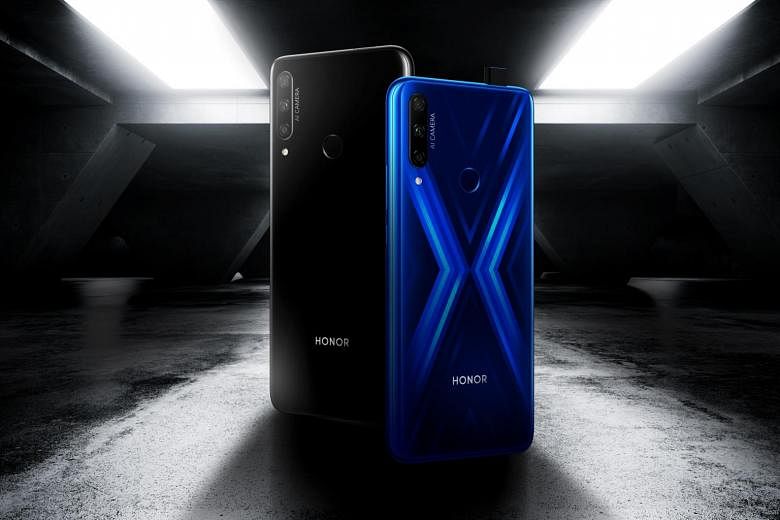The Honor 9X comes with the full suite of Google mobile apps and services, despite being launched here only last month. As the budget sub-brand of Huawei, Honor is affected by the United States trade ban on the Chinese firm.
To get around the ban, the 9X appears to be based on the Huawei P Smart Z smartphone, which was announced before the ban. Given that the US ban remains in place, the 9X could well be the last Honor phone to support Google apps for some time.
The Honor 9X is a mid-range smartphone with an all-screen design without a front selfie camera notch or a hole-punch camera. Instead, it uses a motorised pop-up selfie camera that automatically retracts itself in the event of the phone being dropped.
Its near-bezel-less look is rare for a mid-range phone - watching videos and playing mobile games is a treat on this large 6.59-inch display because of this. For the best visuals, you may want to get rid of the pre-applied screen protector, which is too easily smudged by fingerprints.
Like many phones nowadays, the Honor 9X has a curved glass back that is very prone to fingerprints. While my black review set looks sedate and nondescript, the blue version has a gradient design featuring a large 'X' that is too loud for me.
Its rear fingerprint sensor is well placed and easy to locate by touch. It works quickly and accurately. There is a slight camera bump from the triple rear camera system, which consists of a 48 megapixel (MP) main camera, an 8MP ultra-wide camera and a 2MP depth camera.
This 48MP camera uses pixel-binning to produce 12MP photos that are reasonably sharp and detailed in good lighting conditions. Colours look mostly accurate to me compared to the actual scene, but those hoping for a punchier look will be disappointed. In fact, the ultra-wide camera, while producing less detailed and noisier images, seems to take photos with more vibrant colours.
Like other Huawei and Honor phones, the 9X comes with an AI photography feature that uses artificial intelligence to recognise typical scenes and adjust the camera settings and processing accordingly. For instance, this AI camera will detect low-light conditions and switch to a night photography mode. This software-based mode, however, is distinct from a dedicated Night mode that you select in the app and which uses a four-second long exposure to take low-light photos.
Frankly, the difference between the two night modes seems minimal for most night scenes. While the long-exposure night mode works better to produce slightly more detail in extreme low-light conditions, the AI night mode does not require you to hold the phone in one place steadily for four seconds.
Overall, the 9X's rear cameras are decent for a mid-range phone. They will even do a passable job in low light - colours are mostly true to life, but the photos look smeary when zoomed in.
While I did not expect wireless charging and water resistance from a mid-range model, I was disappointed that the 9X lacks near-field communication (NFC) for mobile payments.
The 9X's mid-range Kirin 710F processor, generally offers smooth performance and runs relatively cool. But it does drop the ball now and then, resulting in slight delays. Apps, too, are not the quickest to load. Graphically demanding games also may not run at the highest possible graphical settings.
For instance, it scored 318 for the single-core test in Geekbench 5 compared to 496 for its rival Redmi Note 8 Pro. The 9X also lagged behind its competitor in Geekbench's multi-core test.
The phone runs on Huawei's EMUI interface, which is based on Android 9. You can expect plenty of preloaded system apps like Huawei's own browser, calculator, clock and app store. But at least there are no banner advertisements in these apps, unlike phones from some other brands.
With a 4,000mAh battery, the 9X comfortably lasts a typical work day for me. But it was not as power efficient at video playback. In a video-loop test at maximum screen brightness, the 9X lasted around 9 hours, which is shorter than expected. In addition, it lacks a fast-charging feature, unlike some of its competitors.
At $329, the 9X matches the pricing of Xiaomi's Redmi Note 8 Pro (starts from $329). But the latter has a 64MP camera, NFC and fast charging.
FOR
Large screen without any camera notch
Decent cameras for its price
AGAINST
Occasional lag
Battery stamina shorter than expected for video playback
Lacks fast charging and near-field communication feature
SPECS
Processor: HiSilicon Kirin 710F (Quad-core 2.2GHz, quad-core 1.7GHz)
Display: 6.59-inch IPS LCD, 2,340 x 1,080 pixels, 391 ppi pixel density
Operating system: EMUI 9.1 (Android 9)
Memory: 128GB (microSD expandable up to 512GB), 6GB RAM
Rear cameras: 48MP (f/1.8), 8MP ultra-wide (f/2.4, 120-degree), 2MP depth (f/2.4)
Front camera: 16MP (f/2.2)
Battery: 4,000mAh
RATING
Features: 4/5
Design:4/5
Performance: 3.5/5
Value for money: 4/5
Battery life: 3.5/5
Overall: 3.5/5


